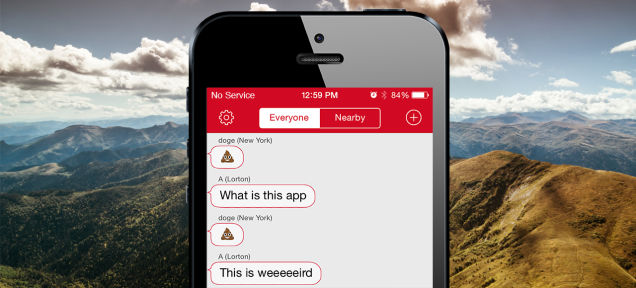FireChat, the clever app that lets people talk to each other without using reception, just got an update that gives its users fixed handles. That might not mean a damn thing to you, which is understandable. FireChat doesn’t have the name recognition of Snapchat. It’s not a popular messaging app. But it should be, and it could be, and this update is an important move in that direction.
So what is FireChat?
FireChat’s a simple chatting service. What makes it special? You can’t send disappearing sexts or rare emojis… but you can send messages to people, even if you have no mobile service. Instead of data or Wi-Fi, FireChat uses iPhones and Androids as nodes in a localised mini-internet. These mini-internets are called mesh networks, and the operate outside of the traditional grid.
That makes FireChat a valuable tool in emergencies, and a political dissident’s best friend. GigaOm also points out that FireChat’s a kickass app for big summer festivals like Burning Man, since reception is notoriously garbage and it’s hard to find friends or locate stuff like water or beer tents when you can’t use iMessage or Twitter.
Right now, FireChat won’t work if you want to talk to another user who lives far away, unless a chain of other users gives you a connection. It requires a relay based on devices nearby. If it becomes a widely used mesh network, however, that won’t be as much of an issue (though obviously getting in the same FireChat with someone from the other end of the world will likely be impossible unless there’s a major innovation; it’s hard to line up friendly phones across the ocean).
FireChat may catch on as a way to corral revelers, but that’s just the beginning of its practical applications. For political organisers, it could become a critically important way to keep protesters and activists connected when their traditional forms of communicating get cut off. For people living in places without developed cell or internet infrastructures, mesh networks like FireChat could be an easy way to talk without waiting for building to begin. For anyone who wants to talk off the grid, FireChat holds the potential for regular people to create temporary, self-contained networks. This app is potent already. It just got even more so.
Why this recent update matters
Giving people who use FireChat fixed usernames cuts down on confusion in a big way. People won’t be able to impersonate each other, which sucks for pranksters but is good news for non-douches. Fixed usernames will also make it easier to find people for repeat communications.
Most importantly, though, the update nudges FireChat away from anonymous chatting apps and moves it towards utilitarian messaging choices. It makes the onboarding process for new users easier to understand. And the more intuitive and user-friendly FireChat is, the more people will stick around using it, making it that much more effective for everyone involved. [GigaOm]
